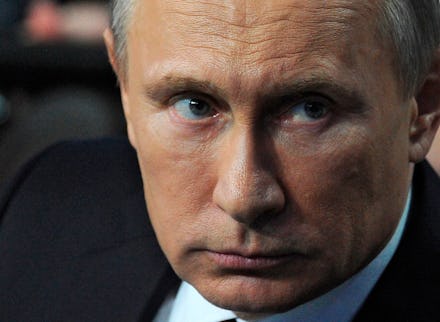It's About to Become Much Harder for Russians to Speak Freely

Russian President Vladimir Putin really hates the Internet.
Back in 2010, he dismissed the online world as being 50% porn. And now, in the latest of unhinged statements about the online world, Putin called the Internet a "CIA project" at a media event Thursday and said that Russia needs to "fight for its interests online."
Putin's paranoid musings on the Internet and bizarre web presence aside, a series of power grabs made in the last week show what many in the country already know: "Russian interests" in this case have a whole lot to do with praising Putin and quelling online dissent. His qualms are not about a cyberstruggle with the United States, but rather the need for the Russian government to control the speech of its public.
A new bill was passed by Russia's legislative assembly Tuesday that rolls back the online rights of its citizens. Part of the legislation requires bloggers with daily page views over 3,000 to register with the government's media oversight body, the Roskomnadzor. Under the law, "bloggers" are loosely defined and can include users of social networks or the "micro-blogging" site Twitter.
Image Credit: AP. The profile of Pavel Durov, founder of Vkontakte, who has now fled Russia.
Registering with the Roskomnadzor will subject users to the same scrutiny as traditional media outlets. The body was behind the selective blacklisting of sites in 2013 and has recently blocked access to websites critical of Russian policy in Ukraine.
"The entire strategy is very efficient because it provokes the rise of self-censorship among users, ISPs and even global platforms," Russian journalist Andrei Soldatov told Index on Censorship. "Many are becoming more and more cautious facing government pressure on the Internet, not very predictable, and thus extremely dangerous."
Other parts of the legislation require that foreign companies like Facebook, Google and Skype store the data of Russian users for up to six months and make the records accessible to the Russian government. If the companies don't comply they could be barred from Russian users.
There have also been allegations of government influence on the Russian social-networking site, VK. When founder and CEO of the "Russian Facebook" Pavel Durov was abruptly sacked under strange circumstances earlier this week, he went to the media alleging that his company is now under the control of two Russian tycoons with ties to the Kremlin. Durov's official replacement has not been chosen, but one of the businessmen he alleged of taking control, Alisher Usmanov, has gobbled up stock in the company.
Durov also claims that Russian security forces had recently demanded he supply the personal contact information for users behind VKontakte groups allegedly linked to Ukraine's Euromaidan.
Activists believe the government's next move in attempting to regulate the internet will be requiring international companies like Google and Skype to store data on local servers.
The Russian government would likely tout the move as a step against foreign (read: NSA) espionage. But net freedom activists worry the possible scenario would be more about keeping tabs on Russian citizens, on the government's own terms and turf.